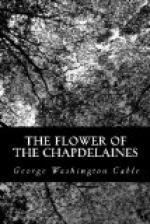I often rode a pony. If we turned inland our way was on a road double-lined with cocoa palms, or up some tangled dell where a silvery cascade leaped through the deep verdure. On one side the tall mahogany dropped its woody pears. On another, sand-box and calabash trees rattled their huge fruit like warring savages. Here the banyan hung its ropes and yonder the tamarind waved its feathery streamers. Here was the rubber-tree, here the breadfruit. Now and then a clump of the manchineel weighted the air with the fragrance of its poisonous apples, the banana rustled, or the bamboo tossed its graceful canes. Beside some stream we might espy black washerwomen beetling their washing. Or, reaching the summit of Blue Mountain, we might look down, eleven hundred feet, on the vast Caribbean dotted with islands, and, nearer by, on breakers curling in noble bays or foaming under rocky cliffs. Northward, the wilderness; eastward, green fields of sugar-cane paling and darkling in the breeze; southward, the wide harbor of Fredericksted, the town, and the black, red-shirted boatmen pushing about the harbor; westward, the setting sun; and presently, everywhere, the swift fall of the tropical night, with lights beginning to twinkle in the town and the boats in the roadstead to leave long wakes of phosphorescent light.
Of course nature had also her bad habits. There were sharks in the sea, and venomous things ashore, and there were the earthquake and the hurricane. Every window and door had heavy shutters armed with bars, rings, and ropes that came swiftly into use whenever between July and October the word ran through the town, “The barometer’s falling.” Then candles and lamps were lighted indoors, and there was happy excitement for a courageous child. I would beg hard to have a single pair of shutters held slightly open by two persons ready to shut them in a second, and so snatched glimpses of the tortured, flying clouds and writhing trees, while old Si’ Myra, one of the freed slaves who never had left us, crouched in a corner and muttered:
“Lo’d sabe us! Lo’d sabe us!”
Once I saw a handsome brig which had failed to leave the harbor soon enough stagger in upon the rocks where it seemed her masts might fall into our own grounds, and grandmamma told me that thus my father, though born in the island, had first met my mother.
XXIX
(THE PLAYERS)
Si’ Myra was a Congo. She believed the Obi priests could boil water without fire, and in many ways cause frightful woes. To her own myths she had added Danish ones. “De wehr-wolf, yes, me chile! Dem nights w’en de moon shine bright and de dogs a-barkin’, you see twelb dogs a-talkin’ togedder in a ring, and one in de middle. Dah dem wait till dem yerry [hear] him; den dem take arter him, me chile,” etc.




